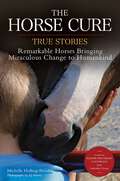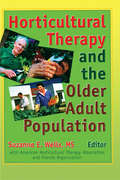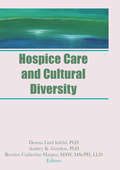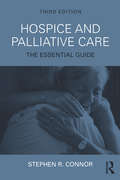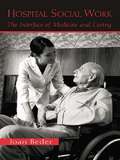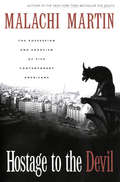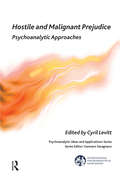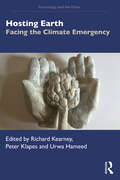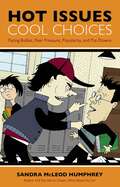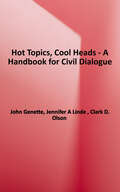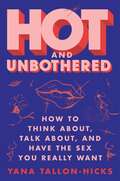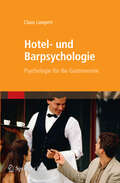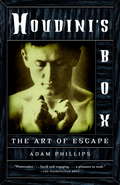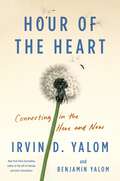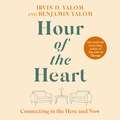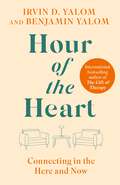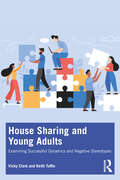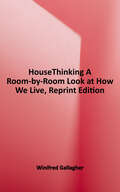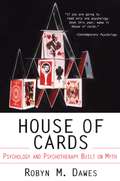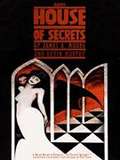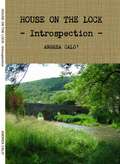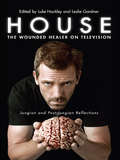- Table View
- List View
Horse Cure
by Michelle Holling-BrooksASHLEY was locked in closets as punishment, and physically and sexually abused, resulting in an angry and violent child who threatened her adoptive family—until she met Cocoa and Radar, the horses that helped her learn to trust again. BRENDA was diagnosed bipolar and lived through humiliating domestic abuse, but three horses—Delilah, Wiscy, and Diesel—helped her establish a sense of self-worth, hope for the future, and ultimately, the will to go on. NICK was angry, suicidal, and a veteran with combat PTSD, who now says, &“Horses literally saved my life.&” Inspired by her own childhood trauma when she spent seven days in a coma, awakened to a severely compromised body and brain, and rebuilt her life with the help of a horse, Michelle Holling-Brooks founded Unbridled Change, a non-profit Equine-Partnered Therapy organization that helps match horses to individuals in need. Here she shares amazing stories of the people she&’s worked with and the &“horse cure&” that changed their lives. Survivors of trauma, loss, illness, abuse, stress, and depression can face seemingly insurmountable obstacles. But today, a growing body of scientific evidence suggests that horses play a crucial role in therapy for those struggling with significant psychological and emotional challenges. Horses respond to angry, inhibited, heartbroken, defiant, terrified clients in many different ways, often breaking through defensive barriers via their physical presence, or by pointing to areas of psychological distress not immediately apparent. The horse&’s response guides the treatment team, as well as the client, in the healing process.
Horticultural Therapy and the Older Adult Population
by Suzanne WellsHorticultural Therapy and the Older Adult Population is the guidebook you’ve been waiting for since the American Horticultural Therapy Association’s (AHTA) 1981 publication. With an updated collection of chapters in the area of horticultural therapy and older adults--ranging from a review of relevant literature to descriptions of existing horticultural therapy programs--this book will stimulate networking and information sharing among horticultural therapists and other professionals working with older adults, spur new ideas, and foster continuing research in the field. The book’s importance is recognized internationally, and it is soon to be published in Japanese.In Horticultural Therapy and the Older Adult Population, you will find chapters on garden designs to enhance the horticultural therapy experience, descriptions of existing horticultural therapy programs for older adults, and new research to evaluate the effectiveness of horticultural therapy with this population. Whether you’re an established horticultural therapist, a nursing home administrator, or a gerontology educator, this book will help you design gardens, set up and evaluate programs, and develop curriculum.Horticultural Therapy and the Older Adult Population also includes the results of a survey sent to all registered members of AHTA who work with the older adult population. The survey responses provide information about the institutions and the population served, programming activities, program staffing, program evaluation, and funding. Another beneficial feature of the book is a resource-packed bibliography. Prepared as a service to horticultural therapists and others working with older adults, it covers the most relevant publications--giving you more places to find inspiration and ideas for improving care to the elderly through horticultural therapy.
Hospice Care and Cultural Diversity
by Donna Infeld Audrey K Gordon Bernice C HarperHospice Care and Cultural Diversity captures the richness and differences that make up the United States and its culture. This book shows you the complex issues arising from work with patients of a different culture and encourages research in hospices which support culturally innovative programs. Many people are individually knowledgeable and culturally sensitive, but few hospices have systematically planned for service to culturally diverse groups. This volume identifies who is implementing organizational programs of cultural sensitivity and acknowledges the efforts of those individuals working to make hospice accessible to everyone.Hospice Care and Cultural Diversity contains original research, personal insights, and overviews to help you understand what is being done in the field. Specifically, chapters discuss: National Hospice Organization activities, goals, and recommended actions death and dying from a Native American perspective breaking barriers to hospice for African Americans a case study of the development of a culturally sensitive treatment plan in pre-hospice south Texas caregiving norms surrounding dying and use of hospice services among Hispanic American elderly cultural considerations surrounding childhood bereavement among Cambodians in the U.S. one hospice’s experience in identifying and meeting the needs of ethnic minority patientsPeople from many different cultures are eager to share their customs, practices, and beliefs. They want hospice providers to understand their culture, and they want their community served by hospice. The only book of its kind, Hospice Care and Cultural Diversity is a valuable reference and source of ideas for anyone interested in the delivery of hospice services. From students to experts, you will find much information to help make hospice care accessible and comfortable for all groups of people.
Hospice and Palliative Care: The Essential Guide
by Stephen R. ConnorThe third edition of Hospice and Palliative Care is the essential guide to the hospice and palliative care movement both within the United States and around the world. Chapters provide mental-health and medical professionals with a comprehensive overview of the hospice practice as well as discussions of challenges and the future direction of the hospice movement. Updates to the new edition include advances in spiritual assessment and care, treatment of prolonged and complicated grief, provision of interdisciplinary palliative care in limited-resource settings, significant discussion of assisted suicide, primary healthcare including oncology, and more. Staff and volunteers new to the field along with experienced care providers and those using hospice and palliative care services will find this essential reading.
Hospital Social Work: The Interface of Medicine and Caring
by Joan BederHospital Social Work introduces the reader to the world of medicine and social work as seen through the eyes of actual social workers. An essential reference for both students and professionals. Over 100 social workers in dozens of hospitals were interviewed to provide the reader with first-hand experiences and discussions of practice principles, policy considerations, and theoretical treatments to provide each chapter with a unique blend of theory and practice. Joan Beder, a professor of social work and a practicing social worker, recently noted an apparent lack of empirical discussion of the actual role and day-to-day functioning of the medical social worker. Hospital Social Work is the result, a unique supplemental text for both studying and practicing medical social workers.
Hostage to the Devil
by Malachi MartinOne On One With SatanA chilling and highly convincing account of possession and exorcism in modern America, hailed by NBC Radio as "one of the most stirring books on the contemporary scene. "
Hostile and Malignant Prejudice: Psychoanalytic Approaches (The International Psychoanalytical Association Psychoanalytic Ideas and Applications Series)
by Cyril LevittHostile and Malignant Prejudice: Psychoanalytic Approaches represents the leading edge of work in the field by members of the International Psychoanalytical Association's Committee on Prejudice (Including Anti-Semitism), psychoanalysts who hail from Belgium, Brazil, Canada, Germany, Peru, Sweden, the United States, and Uruguay. It pursues the issues surrounding hostile and malignant prejudice as defined in the first chapter by Henri Parens, whose path-breaking work over four generations with children and their mothers uncovered the sources of aggression and prejudice on a scale from jocular slurs to murderous genocide. One chapter examines the effects of Latin America's colonial past on the psychic development of a 'mixed race' young man whose analysis implicates a major racial and social divide in the heart of his society. In another chapter we learn of the identity conflicts of children who were separated from their parents during the Holocaust and hidden or 'hidden in plain sight' by adopting a Christian persona.
Hosting Earth: Facing the Climate Emergency (Psychology and the Other)
by Richard Kearney Peter Klapes Urwa HameedHosting Earth is a timely and much-needed volume in the emerging literature of environmental philosophy, drawing upon art, science, and politics to explore alternatives to the traditional domination of nature by humans.Featuring a dialogue with Mary Robinson (former UN High Commissioner for Human Rights and former President of Ireland), which addresses the current climate emergency, this book engages the question of ecological hospitality: what does it mean to be guests of the earth as well as hosts? It includes chapters by cutting-edge scholars in the philosophy of nature, as well as artists, scientists, psychologists, and theologians. The contributors discuss proposals for a new "Poetics of the Earth," opening horizons beyond our perilous Anthropocene to a new Symbiocene of mutual collaboration between human and non-human species.Focusing on the central role that the human psyche plays in answering our current ecological emergency, Hosting Earth is for anybody invested in the future of our planet and how psychological, psychoanalytic, and philosophical thought can reorient the current conversation about ecology.
Hot Issues, Cool Choices: Facing Bullies, Peer Pressure, Popularity, and Put-Downs
by Sandra Mcleod HumphreyDid you know that there are kids out there who don't even want to get out of bed in the morning because they know what going to school means for them? · being teased and taunted ... · being excluded and rejected ... · being afraid that you're going to be assaulted and possibly hurt... · Sometimes it can even mean that you just can't hang in there any longer, so you give up and take your own life. If you are one of the cool kids at school, this book is for you. But if you're not one of the cool kids, this book is especially for you. Emerson Elementary isn't a real school, but it could be your elementary school. And the students at Emerson aren't real kids, but the problems they face are real, and so are the choices they make.The Golden Rule is an old rule, but it's still a good rule to live by, and after reading this book, you may just possibly become a kinder, more compassionate human being, someone who treats others the way you want them to treat you. So come along and join the students at Emerson Elementary and help them make some cool choices!
Hot Topics in Neural Membrane Lipidology
by Akhlaq A. FarooquiGlycerophospholipid and sphingolipid-derived lipid mediators facilitate the transfer of messages not only from one cell to another but also from one subcellular organelle to another. These molecules are not only components of neural membranes but also storage depots for lipid mediators. Information on the generation and involvement of lipid mediators in neurological disorders is scattered throughout the literature in the form of original papers and reviews. This book will provide readers with a comprehensive description of glycerophospholipid, sphingolipid and cholesterol-derived lipid mediators and their involvement in neurological disorders.
Hot Topics, Cool Heads: A Handbook for Civil Dialogue
by John Genette Jennifer A Linde Clark D. OlsonThere is a crying need for civility in our world. From families disagreeing at Thanksgiving tables to the halls of Congress, civility is in short supply. Most people can easily point to daily examples of incivility, but most people are unable to define “civility” or recognize what it looks like, much less practice it. Hot Topics, Cool Heads: A Handbook for Civil Dialogue, written by the founders of the Institute for Civil Dialogue, traces the lack of civility in our society, defines what it is from a communication perspective, then identifies the characteristics of a civil communicator and outlines the importance of civil listening. It then introduces the format of Civil Dialogue®, a method for people to present many sides of hotly contested issues. Through spontaneously participating in an audienced dialogue, participants are led through a facilitated conversation by taking a position on a provocative statement. Civil Dialogue features a semi-circle, where people who strongly agree and strongly disagree must face one another, while those who somewhat agree and somewhat disagree sit next to them, with a neutral or undecided participant completing the semi-circle. A trained facilitator opens the dialogue by asking for brief opening statements, then allowing the participants to freely discuss their thoughts and feelings while following certain “rules of civility.” The audience is then asked for comments and questions before participants give closing statements, followed by a summary of the entire dialogue by the facilitator. By modeling civility, participants learn to understand different perspectives as they give voice to their positions. These skills of a civil communicator can be used in conversations where people vehemently disagree with one another, without the goal of advocacy, but to enhance understanding. Through this understanding comes a greater foundation for democracy. Civil Dialogue can be used in a variety of contexts, so people need not fear having conversations about politics, religion, or sex. The necessary fundamentals of Civil Dialogue are included in the appendices.
Hot and Unbothered: How to Think About, Talk About, and Have the Sex You Really Want
by Yana Tallon-HicksAn acclaimed sex therapist’s practical, playful, and inclusive guide that teaches you how to discover your deepest sexual desires, communicate your wants and needs, define your boundaries, and have the sex you want.While popular culture is saturated with sex, the gap between informed sex education and satisfying sex is vast, and it often leaves LGBTQQ+ individuals out of the conversation entirely. Hot and Unbothered bridges that chasm, giving you explicit permission to talk about, think about, and achieve the pleasure you desire without shame or secrecy, no matter your sexual identity or gender.In Hot and Unbothered, Yana Tallon-Hicks provides a roadmap to empower yourself and improve your relationships, sharing the unique programs she developed for her therapy clients and workshops. She begins by shattering myths about “good sex,” which is seamless, satisfying—and nearly non-existent. Once you let go of unreachable ideals, you can start to truly identify your own unique desires and fears and build the safest space to fulfill your most pleasurable sexual experiences. Yana guides you to discover your own hang-ups and overcome barriers such as shame, secrecy, misinformation, low self-esteem, lack-of-motivation, and unhealthy relationship patterns. When the path to pleasure is cleared the fun begins! Yana helps you decide who you really are as a sexual being and how to set sexual goals. What do you want? What do you like? What have you yet to discover? And how do you want to explore? In answering these questions, you can establish and set your limits, clarify your needs, and communicate your desires to your current partner. Yana reminds you that whether your partner is a lifelong companion or a casual hook-up, your pleasure, comfort, and identity should always be supported.Yana unpacks common stumbling blocks, troubleshoots tricky conversations, and addresses potential backslides to ensure long-lasting success. Complete with worksheets and exercises, as well as playful hand-drawn illustrations, Hot and Unbothered will help you understand, pursue, and fulfill your sexual desires now, and for the rest of your life.
Hotel- und Barpsychologie
by Claus LampertHotel- und Barpsychologie, was ist denn das? Der Diplom Psychologe und Psychologische Psychotherapeut Claus Lampert stellte als Pionier auf dem Gebiet der Hotel- und Barpsychologie fest, dass sich im Gastronomie Bereich viele Mitarbeiter für psychologische Zusammenhänge interessieren. So vermittelt dieses abbildungsreiche Lehrbuch branchenrelevante fundierte psychologische Grundkenntnisse und bietet zahlreiche praktische und alltagsrelevante Übungen, die dazu anregen, die Sichtweise auf das Arbeitsfeld und sich selbst zu hinterfragen. Dieses Werk ist ein kompaktes Lehrbuch für Auszubildende, sowie ein Begleitbuch für die Fort- und Weiterbildung, wie auch eine faszinierende und spannende Lektüre für alle diejenigen, die ihre Kompetenzen und ihr Wissen in diesem Bereich erweitern wollen.
Hotel- und Barpsychologie: Psychologie für die Gastronomie
by Claus LampertHotel- und Barpsychologie, was ist denn das? Der Diplom Psychologe und Psychologische Psychotherapeut Claus Lampert stellte als Pionier auf dem Gebiet der Hotel- und Barpsychologie fest, dass sich im Gastronomie Bereich viele Mitarbeiter für psychologische Zusammenhänge interessieren. So vermittelt dieses abbildungsreiche Lehrbuch branchenrelevante fundierte psychologische Grundkenntnisse und bietet zahlreiche praktische und alltagsrelevante Übungen, die dazu anregen, die Sichtweise auf das Arbeitsfeld und sich selbst zu hinterfragen. Dieses Werk ist ein kompaktes Lehrbuch für Auszubildende, sowie ein Begleitbuch für die Fort- und Weiterbildung, wie auch eine faszinierende und spannende Lektüre für alle diejenigen, die ihre Kompetenzen und ihr Wissen in diesem Bereich erweitern wollen.
Houdini's Box
by Adam PhillipsIn this uniquely brilliant and insightful book, acclaimed essayist and psychoanalyst Adam Phillips meditates on the notion of escape in our society and in ourselves.No one can escape the desire and need to escape. By analyzing four examples of escape artists--a young girl who hides from others by closing her eyes; a grown man incapable of a relationship; Emily Dickinson, recluse extraordinaire; and Harry Houdini, the quintessential master of escape--Phillips enables readers to identify the escape artists lurking within themselves. Lucid, erudite, and audacious, Houdini's Box is another scintillating and seminal work by one of the world's most dazzlingly original thinkers.From the Trade Paperback edition.
Hour of the Heart: Connecting in the Here and Now
by Irvin D. Yalom Benjamin YalomA deeply moving and revealing chronicle of the challenges and breakthroughs that come from a wholly new practice of one-hour, one-time-only sessions, from one of the most prominent psychotherapists of our timeFacing memory loss at age ninety-three as well as the fallout from a global pandemic that moved much of daily life online, legendary psychotherapist and bestselling author Irvin D. Yalom was forced to vastly reconsider the shape of his sessions with patients. Rather than throw in the towel in the face of change, Dr. Yalom considered head-on the limitations imposed by these new realities and revolutionized his practice. Turning his focus to what might be achieved in a one-hour, one-time-only meeting between patient and practitioner, Dr. Yalom employed an even more concerted use of his “here and now” approach.In Hour of the Heart, Yalom recounts some of these intense, life-changing sessions, exploring an array of human predicaments and his own late-career development as a therapist. In recounting these consultations, he shows how a therapist’s willingness to be open helps patients let down their own guards, leading to a deeper and more immediate connection—one necessary to achieving profound realizations in just sixty minutes. This vulnerability led Yalom to disclose details about his personal life that he might previously have kept hidden from patients, including his traumatic childhood in Washington, DC, the evolution of his thinking about philosophy and psychotherapy, and the recent death of his wife. Throughout, he pushes the boundaries of self-revelation as a therapeutic tool.Life is precious and our time together short. Written in collaboration with his son, Hour of the Heart shows us how to relate to each other better in the moment, with more honesty and vulnerability. That hour of connection, occurring during a time of isolation and grief for so many, helped to sustain both patient and therapist, and enriched Yalom’s vision of what psychotherapy can do.
Hour of the Heart: Connecting in the Here and Now
by Irvin Yalom Benjamin YalomA deeply moving and revealing chronicle, from one of the most prominent psychotherapists of our time, of working under wholly new circumstances, and the challenges and breakthroughs he's made as he takes on patients for one hour, one time only.Facing memory loss at age 93, as well as the fallout from a pandemic that moved much of daily life online, legendary psychotherapist and bestselling author Irvin Yalom was forced to vastly reconsider the shape of his sessions with patients. But rather than throw in the towel in the face of change, Dr Yalom considered the limitations imposed by these new realities head on, and revolutionized his practice. Dr Yalom wondered if perhaps his own practice could focus deeply on the work that could be achieved in a one-hour, one-time meeting between patient and practitioner-employing an even more concerted use of his "here and now" approach. As he began these one-time sessions, the beloved veteran therapist found himself freed to reach ever deeper places with new patients on a shortened timeline, without the buffer of future appointments.In HOUR OF THE HEART, Yalom recounts some of these intense, life-changing consultations, exploring an array of human predicaments, and his own late-career development as a therapist. In recounting these consultations, he shows how a therapist's willingness to be open themselves helps the patient let down their own guard, leading to a deeper and more immediate connection-one necessary to achieve profound realizations in just sixty minutes.Life is precious and our time together short. HOUR OF THE HEART shows us how to relate to each other better in the moment, with more honesty and vulnerability. That hour of connection, occurring during a time of isolation and grief for so many, helped to sustain both patient and therapist, and enriched Yalom's vision of what psychotherapy can do. This transformative account of a new way of connecting and sharing is for all of us looking to build relationships with greater immediacy, authenticity, and openness-in every area of life.
Hour of the Heart: Connecting in the Here and Now
by Irvin Yalom Benjamin YalomA deeply moving and revealing chronicle, from one of the most prominent psychotherapists of our time, of working under wholly new circumstances, and the challenges and breakthroughs he's made as he takes on patients for one hour, one time only.Facing memory loss at age 93, as well as the fallout from a pandemic that moved much of daily life online, legendary psychotherapist and bestselling author Irvin Yalom was forced to vastly reconsider the shape of his sessions with patients. But rather than throw in the towel in the face of change, Dr Yalom considered the limitations imposed by these new realities head on, and revolutionized his practice. Dr Yalom wondered if perhaps his own practice could focus deeply on the work that could be achieved in a one-hour, one-time meeting between patient and practitioner-employing an even more concerted use of his "here and now" approach. As he began these one-time sessions, the beloved veteran therapist found himself freed to reach ever deeper places with new patients on a shortened timeline, without the buffer of future appointments.In HOUR OF THE HEART, Yalom recounts some of these intense, life-changing consultations, exploring an array of human predicaments, and his own late-career development as a therapist. In recounting these consultations, he shows how a therapist's willingness to be open themselves helps the patient let down their own guard, leading to a deeper and more immediate connection-one necessary to achieve profound realizations in just sixty minutes.Life is precious and our time together short. HOUR OF THE HEART shows us how to relate to each other better in the moment, with more honesty and vulnerability. That hour of connection, occurring during a time of isolation and grief for so many, helped to sustain both patient and therapist, and enriched Yalom's vision of what psychotherapy can do. This transformative account of a new way of connecting and sharing is for all of us looking to build relationships with greater immediacy, authenticity, and openness-in every area of life.
House Sharing and Young Adults: Examining successful dynamics and negative stereotypes
by Keith Tuffin Vicky ClarkHouse Sharing and Young Adults offers unique insight into the dynamics of successful house sharing among young adults and questions some of the myths fostered by the negative stereotyping of housemates. Illustrated with research from interviews with young adults, it explores co-residence, interpersonal relationships and young people’s development. Beginning with an overview of the concept and history of house sharing among young adults, Clark and Tuffin’s volume also examines the reasons for the lack of research into the area up until recently. It explores key questions, including how young adults choose housemates, what makes a desirable housemate, avoiding complications, the psychological advantages of house sharing, how conflict arises, and the impact of house sharing on adult development. The authors challenge the stigma of shared domesticity, demonstrating the potential of house sharing to enhance well-being through companionship while acknowledging the potential pitfalls caused by tension in intimate settings. House Sharing and Young Adults will be essential reading for both undergraduate and postgraduate students of social psychology, developmental psychology, sociology and anthropology, as well as those interested in group dynamics, housing demographics and discrimination.
House Thinking: A Room-by-Room Look at How We Live
by Winifred Gallagher“A fascinating book that investigates and explains the emotional impact our homes have on our lives. House Thinking . . . guides the way for us to live out our most creative selves at home.” —Wendy Goodman, interior design editor, New York magazine IKEA, Ethan Allen and HGTV may have plenty to say about making a home look right, but what makes a home feel right? In House Thinking, journalist and cultural critic Winifred Gallagher takes the reader on a psychological tour of the American home. By drawing on the latest research in behavioral science, an overview of cultural history, and interviews with leading architects and designers, she shows us not only how our homes reflect who we are but also how they influence our thoughts, feelings, and actions. How does your entryway prime you for experiencing your home? What makes a bedroom a sensual oasis? How can your bathroom exacerbate your worst fears? House Thinking addresses provocative questions like these, enabling us to understand the homes we've made for ourselves in a unique and powerful new way. It is an eye-opening look at how we live . . . and how we could live.
House of Cards
by Robyn DawesRobin Dawes spares no one in this powerful critique of modern psychotherapeutic practice. As Dawes points out, we have all been swayed by the "pop psych" view of the world--believing, for example, that self-esteem is an essential precursor to being a productive human being, that events in one's childhood affect one's fate as an adult, and that "you have to love yourself before you can love another."
House of Secrets
by Kevin C. Murphy James MooreThe first novel based on Vampire: The Eternal Struggle collectible card game from Wizards of the Coast. It takes you deep into the World of Darkness, a world where vampires engage in the ultimate struggle for power under the cover of darkness.
House on the lock
by Rosemary Dawn Allison Andrea Calo'Book Description Wisdom is enclosed in the heart of each one of us. Serves only courage to bring it out. Look inside; question your own conscience to have the hidden secrets held therein emerge. This is the key to understanding ourselves and the entire world.
House: Jungian and Post-Jungian Reflections
by Leslie Gardner Luke HockleyHouse MD is a globally successful and long-running medical drama. House: The Wounded Healer on Television employs a Jungian perspective to examine the psychological construction of the series and its namesake, Dr Gregory House. The book also investigates the extent to which the continued popularity of House MD has to do with its representation of deeply embedded cultural concerns. It is divided into three parts - Diagnosing House, Consulting House and Dissecting House, - and topics of discussion include: specific details, themes, motifs and tropes throughout the series narrative, character and visual structure the combination of performative effects, text and images of the doctor and his team the activities of the hero, the wounded healer and the puer aeternus. Offering an entirely fresh perspective on House MD, with contributions from medical professionals, academics and therapists, this book is essential reading for students and scholars of Jungian psychology. The inclusion of a glossary of Jungian terms means that this book can also be enjoyed by fans of House MD who have been seeking a more in-depth analysis of the series.
Household Economic Behaviors
by J. A. MolinaSignificant recent changes in the structure and composition of households make the study of the economic relationships within the household of particular interest for academics and policy-makers. In this context, Household Economic Behaviors, through its focus on theoretical and empirical chapters on a range of economic behaviors within the household, provides a new and timely viewpoint. Following the Introduction and one or two surveys which give a general background, the volume includes theoretical and empirical perspectives on allocation of available time within the household, monetary and non-monetary transfers between household members, and intra-household bargaining.
